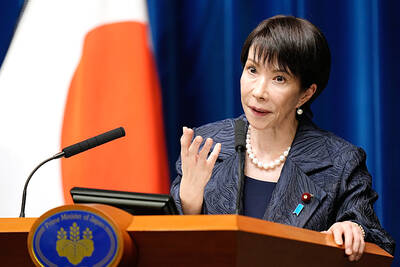The Environmental Protection Administration (EPA) yesterday released the results of a study on the carbon emissions absorbed by 22 different species of trees that they hope will help the government and the public plan green initiatives.
Several species, including the Taiwan zelkova, Indian rosewood and Chinese Pistachios, were found to have the greatest efficiency in absorbing carbon — more than 0.5mg of the pollutant per second — the study found.
EPA officials said that the figures would be a good reference point for corporations looking to offset emissions as part of the Greenhouse Gas Reduction Act (溫室氣體減量法), which is expected to become law early next year.
The act has been held up in the legislature since 2006 because of the controversial clauses covering a system of carbon trading and emissions offsetting.
Environmental activists have called on the legislature to scrap the act and implement a carbon tax instead. They say a carbon tax would be more effective.
Hsieh Yein-rui (謝燕儒), who heads the EPA’s Air Quality Protection and Noise Control Department, said the agency would try to introduce additional incentives for tree planters after the law is passed to complement enticements provided by the Forestry Bureau.
However, he said it would be difficult for tree planters to make a profit in Taiwan from selling emissions offsets because of the nation’s limited amount of open space and the low price of carbon emissions internationally, which currently stand at 14 euros (US$20) per tonne.
Organizations led by the Taiwan Environmental Action Network (TEAN) have expressed concern that international carbon trading schemes would lead to a massive outflow of “green” capital because of the high domestic cost and relatively cheaper offsets in neighboring countries such as China.
The study also took into account the amount of time a tree needs to mature and its absorption of other airborne pollutants.

The Ministry of Foreign Affairs (MOFA) yesterday voiced dissatisfaction with the Comprehensive and Progressive Agreement for Trans- Pacific Partnership (CPTPP), whose latest meeting, concluded earlier the same day, appeared not to address the country’s application. In a statement, MOFA said the CPTPP commission had "once again failed to fairly process Taiwan’s application," attributing the inaction to the bloc’s "succumbing to political pressure," without elaborating. Taiwan submitted its CPTPP application under the name "Separate Customs Territory of Taiwan, Penghu, Kinmen and Matsu" on Sept. 22, 2021 -- less than a week after China

THE GOOD WORD: More than 100 colleges on both sides of the Pacific will work together to bring students to Taiwan so they can learn Mandarin where it is spoken A total of 102 universities from Taiwan and the US are collaborating in a push to promote Taiwan as the first-choice place to learn Mandarin, with seven Mandarin learning centers stood up in the US to train and support teachers, the Foundation for International Cooperation in Higher Education of Taiwan (FICHET) said. At the annual convention of the American Council on the Teaching of Foreign Languages held over the weekend in New Orleans, Louisiana, a Taiwan Pavilion was jointly run by 17 representative teams from the FICHET, the Overseas Community Affairs Council, the Steering Committee for the Test of Proficiency-Huayu, the

A home-style restaurant opened by a Taiwanese woman in Quezon City in Metro Manila has been featured in the first-ever Michelin Guide honoring exceptional restaurants in the Philippines. The restaurant, Fong Wei Wu (豐味屋), was one of 74 eateries to receive a “Michelin Selected” honor in the guide, while one restaurant received two Michelin stars, eight received one star and 25 were awarded a “Bib Gourmand.” The guide, which was limited to restaurants in Metro Manila and Cebu, was published on Oct. 30. In an interview, Feng Wei Wu’s owner and chef, Linda, said that as a restaurateur in her 60s, receiving an

MORE RETALIATION: China would adopt a long-term pressure strategy to prevent other countries or future prime ministers following in Sanae Takaichi’s steps, an academic said Taiwan should maintain communications with Japan, as Japanese Prime Minister Sanae Takaichi is to lead a revision of security documents, Taiwanese academics said yesterday. Tensions have risen between Japan and China over remarks by Takaichi earlier this month that the use of force against Taiwan would constitute a “survival-threatening situation” for Japan. Prospect Foundation president Lai I-chung (賴怡忠) yesterday said Takaichi’s stance regarding Taiwan is the same as past Japanese prime ministers, but her position is clearer than that of her predecessors Fumio Kishida and Shigeru Ishiba. Although Japan views a “Taiwan contingency” as a “survival-threatening situation,” which would allow its military to